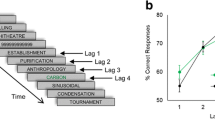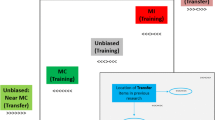Abstract
Mitigating the negative impacts of anthropogenic climate change is among the most serious and pressing challenges facing the global community. Despite the severity of the issue, there seems to be a lack of attention paid to climate change in our daily lives. Yet, climate change-related information can capture observers’ attention, and when attention is drawn to a particular environmental risk, the perceived severity of this attended risk is enhanced. The question then is whether attention to climate change-related information can be modified or enhanced. Here, we report the results of two experiments using single-session attention bias modification training procedures designed to increase attentional focus on climate change-related information. In Experiment 1, attention training to emotionally positive images of climate change (e.g., potential solutions such as windmills and solar panels) increased attention to these images, but not emotionally negative images of climate change (e.g., air pollution, natural disasters, and melting ice). In Experiment 2, this effect was replicated. In addition, Experiment 2 revealed that training to emotionally negative images of climate change increased attention to negative images of climate change, and there was a trend for this enhanced attention to generalize to positive images of climate change. Furthermore, attention training towards negative images of climate change enhanced self-reported levels of concern about climate change. Collectively, our results suggest that attention training can increase the allocation of attention to climate change-related information and, under certain training conditions, concern for climate change increases.




Similar content being viewed by others
Data availability
The data for this manuscript can be found at https://osf.io/g5vut/.
Notes
The following images were used in Experiment 1: 12, 13, 29, 39, 46, and 49 (positive relevant); 8, 18, 23, 20, 37, and 62 (negative relevant); and 178, 194, 200, 210, 221, 240, 256, 277, 280, 303, 308, and 315 (irrelevant).
Given that we used positive images of (potential) climate change solutions (e.g., solar panels and windmills), we wanted to know if focusing on these solutions might increase optimism.
Note that the Climate Change Anxiety Questionnaire was collected following training in all groups in Experiment 2. As reported in Table 4, all four groups did not differ in climate change anxiety. Therefore, the ABM variant used in the current study did not appear to induce anxiety. However, longer interventions may induce anxiety and it will be important for future research to assess this possibility.
Pretraining data was combined across Experiments 1 and 2 to maximize the power to detect differences across sex and political orientation (tested in separate models). Main effects for sex (F(1, 192) = 0.12, p = .73, Partial η2 = .001) and political orientation (F(3, 191) = 0.74, p = .53, Partial η2 = .012) on attentional bias were non-significant. Similarly, the interaction with emotion was non-significant for sex (F(1, 192) = 0.54, p = .47, Partial η2 = .003) and political orientation (F(3, 191) = 0.58, p = .63, Partial η2 = .009).
References
Beattie G, McGuire L (2012) See no evil? Only implicit attitudes predict unconscious eye movements towards images of climate change. Semiotica 2012(192):315–339
Bradley GL, Babutsidze Z, Chai A, Reser JP (2020) The role of climate change risk perception, response efficacy, and psychological adaptation in pro-environmental behavior: a two nation study. J Environ Psychol 68:101410
Brosch T, Sander D, Pourtois G, Scherer KR (2008) Beyond fear: rapid spatial orienting toward positive emotional stimuli. Psychol Sci 19(4):362–370. https://doi.org/10.1111/j.1467-9280.2008.02094.x
Campbell A, Muncer S (2017) Sex difference in awareness of threat: a meta-analysis of sex differences in attentional orienting in the dot probe task. Personality Individ Differ 119:181–184
Carlson JM (2018) Reactive emotional processes in the absence of conscious awareness. In: Fox AS, Lapate RC, Shackman AJ, Davidson RJ (eds) The nature of emotion: fundamental questions. Oxford University Press, Oxford, pp 312–316
Carlson JM, Lehman BR, Thompson JL (2019) Climate change images produce an attentional bias associated with pro-environmental disposition. Cogn Process 20(3):385–390. https://doi.org/10.1007/s10339-019-00902-5
Carlson JM, Kaull H, Steinhauer M, Zigarac A, Cammarata J (2020) Paying attention to climate change: positive images of climate change solutions capture attention. J Environ Psychol 71:101477
Chica A, Bartolomeo P (2012) Attentional routes to conscious perception. Front Psychol 3(1). https://doi.org/10.3389/fpsyg.2012.00001
Clayton S (2020) Climate anxiety: psychological responses to climate change. J Anxiety Disord 74:102263
Clayton S, Karazsia BT (2020) Development and validation of a measure of climate change anxiety. J Environ Psychol 69:101434
Cristea IA, Kok RN, Cuijpers P (2015) Efficacy of cognitive bias modification interventions in anxiety and depression: meta-analysis. Br J Psychiatry 206(1):7–16. https://doi.org/10.1192/bjp.bp.114.146761
Dunlap RE, Van Liere KD, Mertig AG, Jones RE (2000) Measuring endorsement of the new ecological paradigm: a revised NEP scale. J Soc Issues 56(3):425–442
Fodor LA, Georgescu R, Cuijpers P, Szamoskozi Ş, David D, Furukawa TA, Cristea IA (2020) Efficacy of cognitive bias modification interventions in anxiety and depressive disorders: a systematic review and network meta-analysis. Lancet Psychiatry 7(6):506–514. https://doi.org/10.1016/S2215-0366(20)30130-9
Grafton B, Ang C, MacLeod C (2012) Always look on the bright side of life: the attentional basis of positive affectivity. Eur J Pers 26(2):133–144
Hawcroft LJ, Milfont TL (2010) The use (and abuse) of the new environmental paradigm scale over the last 30 years: a meta-analysis. J Environ Psychol 30(2):143–158
Heeren A, Mogoase C, Philippot P, McNally RJ (2015) Attention bias modification for social anxiety: a systematic review and meta-analysis. Clin Psychol Rev 40:76–90. https://doi.org/10.1016/j.cpr.2015.06.001
Heeren A, Mouguiama-Daouda C, Contreras A (2022) On climate anxiety and the threat it may pose to daily life functioning and adaptation: a study among European and African French-speaking participants. Clim Change 173(1):1–17
Klawohn J, Hajcak G, Amir N, Kathmann N, Riesel A (2020) Application of attentional bias modification training to modulate hyperactive error-monitoring in OCD. Int J Psychophysiol 156:79–86. https://doi.org/10.1016/j.ijpsycho.2020.07.005
Kuckertz JM, Amir N (2015) Attention bias modification for anxiety and phobias: current status and future directions. Curr Psychiatry Rep 17(2):9. https://doi.org/10.1007/s11920-014-0545-x
Lehman B, Thompson J, Davis S, Carlson JM (2019) Affective images of climate change. Front Psychol 10:960. https://doi.org/10.3389/fpsyg.2019.00960
Luo Y, Zhao J (2019) Motivated attention in climate change perception and action. Front Psychol 10:1541
Luo Y, Zhao J (2021) Attentional and perceptual biases of climate change. Curr Opin Behav Sci 42:22–26
MacLeod C, Mathews A, Tata P (1986) Attentional bias in emotional disorders. J Abnorm Psychol 95(1):15–20. https://doi.org/10.1037/0021-843X.95.1.15
MacLeod C, Rutherford E, Campbell L, Ebsworthy G, Holker L (2002) Selective attention and emotional vulnerability: assessing the causal basis of their association through the experimental manipulation of attentional bias. J Abnorm Psychol 111(1):107–123. https://doi.org/10.1037/0021-843X.111.1.107
MacLeod C, Mathews A (1988) Anxiety and the allocation of attention to threat. Q J Exp Psychol A, 40(4) 653–670. http://www.ncbi.nlm.nih.gov/entrez/query.fcgi?cmd=Retrieve&db=PubMed&dopt=Citation&list_uids=3212208
Mathews A, MacLeod C (2002) Induced processing biases have causal effects on anxiety. Cogn Emot 16(3):331–354. https://doi.org/10.1080/02699930143000518
Meis-Harris J, Eyssel F, Kashima Y (2021) Are you paying attention? How pro-environmental tendencies relate to attentional processes. J Environ Psychol 74:101591
Mogg K, Waters AM, Bradley B (2017) Attention bias modification (ABM): review of effects of multisession ABM training on anxiety and threat-related attention in high-anxious individuals. Clin Psychol Sci 5(4):698–717. https://doi.org/10.1177/2167702617696359
Mrkva K, Cole JC, Van Boven L (2021) Attention increases environmental risk perception. J Exp Psychol Gen 150(1):83
Mumenthaler C, Renaud O, Gava R, Brosch T (2021) The impact of local temperature volatility on attention to climate change: evidence from Spanish tweets. Glob Environ Chang 69:102286
Pecl GT, Araújo MB, Bell JD, Blanchard J, Bonebrake TC, Chen I-C, Clark TD, Colwell RK, Danielsen F, Evengård B, Falconi L, Ferrier S, Frusher S, Garcia RA, Griffis RB, Hobday AJ, Janion-Scheepers C, Jarzyna MA, Jennings S, Lenoir J, Linnetved HI, Martin VY, McCormack PC, McDonald J, Mitchell NJ, Mustonen T, Pandolfi JM, Pettorelli N, Popova E, Robinson SA, Scheffers BR, Shaw JD, Sorte CJB, Strugnell JM, Sunday JM, Tuanmu M-N, Vergés A, Villanueva C, Wernberg T, Wapstra E, Williams SE (2017) Biodiversity redistribution under climate change: Impacts on ecosystems and human well-being. Science 355(6332):eaai9214. https://doi.org/10.1126/science.aai9214
Rosenholtz R, Li Y, Nakano L (2007) Measuring visual clutter. J Vis 7(2) 17 11–22. https://doi.org/10.1167/7.2.17
Schneider CR, Zaval L, Markowitz EM (2021) Positive emotions and climate change. Curr Opin Behav Sci 42:114–120
Sisco MR, Pianta S, Weber EU, Bosetti V (2021) Global climate marches sharply raise attention to climate change: analysis of climate search behavior in 46 countries. J Environ Psychol 75:101596
Sollberger S, Bernauer T, Ehlert U (2017) Predictors of visual attention to climate change images: an eye-tracking study. J Environ Psychol 51:46–56
Sylvain R, Gilbertson H, Carlson JM (2020) Single session positive attention bias modification training enhances reward-related electrocortical responses in females. Int J Psychophysiol 156:10–17. https://doi.org/10.1016/j.ijpsycho.2020.07.002
Torrence RD, Wylie E, Carlson JM (2017) The time-course for the capture and hold of visuospatial attention by fearful and happy faces. J Nonverbal Behav. https://doi.org/10.1007/s10919-016-0247-7
Turton R, Bruidegom K, Cardi V, Hirsch CR, Treasure J (2016) Novel methods to help develop healthier eating habits for eating and weight disorders: a systematic review and meta-analysis. Neurosci Biobehav Rev 61:132–155. https://doi.org/10.1016/j.neubiorev.2015.12.008
Whitman JC, Zhao J, Roberts KH, Todd RM (2018) Political orientation and climate concern shape visual attention to climate change. Clim Change 147(3):383–394
Zhang MW, Ying JB, Song G, Fung DS, Smith HE (2018) Recent advances in attention bias modification for substance addictions. Int J Environ Res Public Health 15(4):676. https://doi.org/10.3390/ijerph15040676
Acknowledgements
We would like to thank the students at the Northern Michigan University for participating in this research as well as the students in the Cognitive × Affective Behavior & Integrative Neuroscience (CABIN) Lab for assisting in the collection of this data.
Author information
Authors and Affiliations
Contributions
JMC designed the study, analyzed the data, and drafted the manuscript. MV, JF, and LG collected the data. All authors edited and provided critical feedback on the draft manuscript.
Corresponding author
Ethics declarations
Ethical approval
All procedures performed in studies involving human participants were in accordance with the ethical standards of the institutional and/or national research committee and with the 1964 Helsinki declaration and its later amendments or comparable ethical standards.
Informed consent
Informed consent was obtained from all individual participants included in the study.
Competing interests
The authors declare no competing interests.
Additional information
Publisher's note
Springer Nature remains neutral with regard to jurisdictional claims in published maps and institutional affiliations.
Rights and permissions
Springer Nature or its licensor (e.g. a society or other partner) holds exclusive rights to this article under a publishing agreement with the author(s) or other rightsholder(s); author self-archiving of the accepted manuscript version of this article is solely governed by the terms of such publishing agreement and applicable law.
About this article
Cite this article
Carlson, J.M., Voltz, M., Foley, J. et al. Changing how you look at climate change: attention bias modification increases attention to climate change. Climatic Change 175, 16 (2022). https://doi.org/10.1007/s10584-022-03471-3
Received:
Accepted:
Published:
DOI: https://doi.org/10.1007/s10584-022-03471-3




